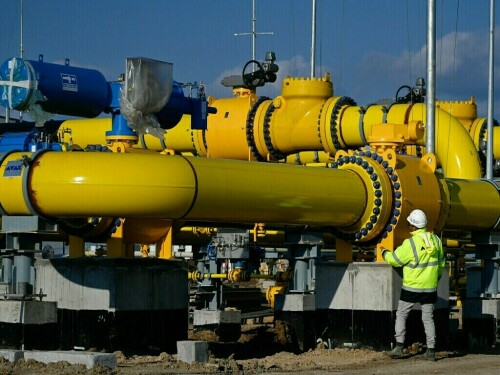Moscow and Tehran Finalize Gas Deal, Russia to Fund Nuclear Plant
Moscow and Tehran have come to an arrangement concerning annual Russian gas deliveries of 55 billion cubic meters; however, pricing is still under discussion. Furthermore, Russia has committed to financing the construction of a new nuclear power facility in Iran, according to statements made by officials on Friday.
These preliminary agreements arise as the United States seeks to isolate Iran internationally unless Tehran consents to a revised agreement involving inspections of its nuclear sites.
Since the onset of the military actions in Ukraine, Russia has reinforced its bonds with Iran, culminating in a strategic partnership treaty signed in January. Both nations are subject to Western sanctions, and Moscow’s exports of oil and gas to Europe have significantly diminished.
Russia has a well-established history of collaboration with Iran, having assisted in the construction of a nuclear reactor at Bushehr, Iran’s first.
Iranian Oil Minister Mohsen Paknejad recently visited Moscow, where he engaged with Russian Energy Minister Sergei Tsivilev at an intergovernmental commission meeting.
According to Shana News Agency, Paknejad stated that the two countries concurred on a gas transfer agreement for 55 billion cubic meters, and Moscow would provide credit to fund the construction of a new nuclear power plant in Iran.
Despite possessing the world’s second-largest gas reserves after Russia, Iran imports gas, including from Turkmenistan, because of significant underinvestment partly due to U.S. sanctions.
Tsivilev mentioned, alongside Paknejad, that Russia might supply Iran with 1.8 billion cubic meters of natural gas this year, with the price yet to be determined.
During a meeting in the Kremlin in January with his Iranian counterpart Masoud Pezeshkian, Russian President Vladimir Putin indicated that Russia could eventually supply up to 55 billion cubic meters (bcm) of gas annually to Iran, starting with smaller volumes of up to 2 bcm.
The 55 bcm figure mirrors the capacity of the Nord Stream 1 undersea pipelines to Europe, which were damaged in 2022 and have been inactive since.
On state television, Paknejad announced Iran would sign a $4 billion agreement with Russian companies to develop seven Iranian oilfields.
Following a meeting of a Russo-Iranian economic cooperation commission, he and the Russian minister finalized a document of bilateral agreements; however, the specific details were not revealed.
Last June, Russian gas giant Gazprom signed a memorandum with the National Iranian Gas Company for the supply of Russian pipeline gas to Iran. The potential routes for the pipeline remain undisclosed.
Paknejad stated Iran would implement the agreements with Gazprom, including a regional hub for gas distribution. The establishment of such a hub in Iran, potentially involving Qatar and Turkmenistan, has been a long-standing discussion between the two countries.
OPEC+
Paknejad met with Russian Deputy Prime Minister Alexander Novak, Putin’s representative for dealings with the Organization of the Petroleum Exporting Countries (OPEC), on Thursday.
On Friday, Paknejad noted considerable uncertainties in the global oil market, including the impact of tariff wars.
In April, U.S. President Donald Trump announced significant tariffs on most other nations, impacting business and consumer confidence and triggering a rapid selloff of U.S. assets.
Paknejad also stated that OPEC+ would make decisions to ensure market stability but did not specify what these decisions might involve.
According to sources familiar with OPEC+ discussions, several members of OPEC+ have proposed accelerating oil output hikes in June for the second consecutive month. OPEC+ will convene in early May to decide on its policy.
Trump has urged OPEC to reduce oil prices while pursuing a policy of “maximum pressure” on Iran, aiming to eliminate its oil exports.



Comments (0)
No comments yet. Be the first to comment!
Leave a Comment